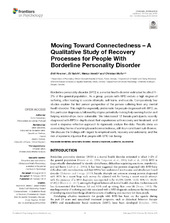Moving Toward Connectedness – A Qualitative Study of Recovery Processes for People With Borderline Personality Disorder
Peer reviewed, Journal article
Published version

Åpne
Permanent lenke
https://hdl.handle.net/1956/20676Utgivelsesdato
2019-02-28Metadata
Vis full innførselSamlinger
Originalversjon
https://doi.org/10.3389/fpsyg.2019.00430Sammendrag
Borderline personality disorder (BPD) is a mental health disorder estimated to affect 1–2% of the general population. As a group, people with BPD endure a high degree of suffering, often leading to suicide attempts, self-harm, and suicide. Comparatively few studies explore the first person perspective of the person suffering from any mental health disorder. This might be especially problematic for people diagnosed with BPD, as this particular diagnosis is followed by stigma potentially making help seeking harder and helping relationships more vulnerable. We interviewed 12 female participants recently diagnosed with BPD in-depth about their experiences with recovery and treatment, and used a stepwise reflective approach to rigorously analyze the data. Results show an overarching theme of working toward connectedness, with four constituent sub-themes. We discuss the findings with regard to empirical work, recovery and autonomy, and the risk of epistemic injustice that people with BPD risk facing.
